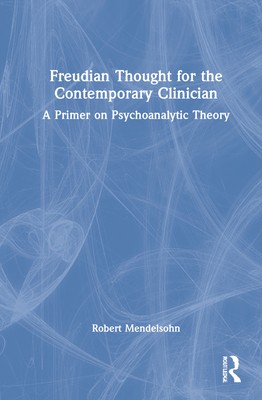
- We will send in 10–14 business days.
- Author: Robert Mendelsohn
- Publisher: Routledge
- ISBN-10: 0367774437
- ISBN-13: 9780367774431
- Format: 15.6 x 23.4 x 1.3 cm, hardcover
- Language: English
- SAVE -10% with code: EXTRA
Freudian Thought for the Contemporary Clinician (e-book) (used book) | bookbook.eu
Reviews
Description
This book uses clear language, modern contexts and key psychoanalytic concepts to exemplify how Sigmund Freud's thinking and legacy is directly relevant to contemporary therapists.
Interweaving theory with history, Freudian Thought for the Contemporary Clinician allows readers to take a walk in Freud's shoes, offering a new framework for understanding his arcane language and the cultural mores of the early 20th century. Robert Mendelsohn explores topics including sexuality and gender, racial injustice and cultural differences with direct reference to Freud's cases, demonstrating how traditional psychoanalytic ideas may inform solutions to issues we face today.
Featuring clinical examples and philosophical explorations delivered in an accessible style, Freudian Thought for the Contemporary Clinician will be a key text for psychoanalytic clinicians in practice and in training. It will also be of great interest to academics and scholars of psychoanalytic studies, the history of psychology and the history of ideas.
EXTRA 10 % discount with code: EXTRA
The promotion ends in 19d.05:12:48
The discount code is valid when purchasing from 10 €. Discounts do not stack.
- Author: Robert Mendelsohn
- Publisher: Routledge
- ISBN-10: 0367774437
- ISBN-13: 9780367774431
- Format: 15.6 x 23.4 x 1.3 cm, hardcover
- Language: English English
This book uses clear language, modern contexts and key psychoanalytic concepts to exemplify how Sigmund Freud's thinking and legacy is directly relevant to contemporary therapists.
Interweaving theory with history, Freudian Thought for the Contemporary Clinician allows readers to take a walk in Freud's shoes, offering a new framework for understanding his arcane language and the cultural mores of the early 20th century. Robert Mendelsohn explores topics including sexuality and gender, racial injustice and cultural differences with direct reference to Freud's cases, demonstrating how traditional psychoanalytic ideas may inform solutions to issues we face today.
Featuring clinical examples and philosophical explorations delivered in an accessible style, Freudian Thought for the Contemporary Clinician will be a key text for psychoanalytic clinicians in practice and in training. It will also be of great interest to academics and scholars of psychoanalytic studies, the history of psychology and the history of ideas.


Reviews